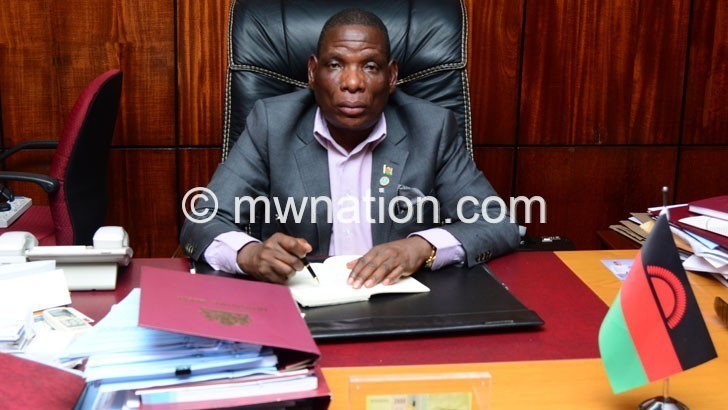Minister promises balanced budget
Minister of Finance, Economic Planning and Development Joseph Mwanamvekha has hinted that the 2019/20 National Budget will be a balanced fiscal plan that will sustain economic stability while bolstering growth rate.
Mwanamvekha, who will this afternoon present his maiden fiscal plan in Parliament in Lilongwe, said in an interview on Sunday the key focus will be to consolidate the recent macroeconomic gains achieved this far.
He said: “For sure, this budget will ride on the economic stability the country has achieved. It will be a balanced fiscal plan.”

The minister will be presenting the budget amid a mixed performance in the economy, with most key macroeconomic indicators largely remaining stable.
Malawi’s headline inflation is still in single digit lane at 9.3 percent as of July 2019 and forecasts indicate a continued decline to around five percent in the short to medium-term.
Interest rates have also fallen to a record low in commercial banks, following back-to-back cuts in policy rate or base lending rate—the rate at which commercial banks borrow from the Reserve Bank of Malawi as the lender of last resort. The policy rate is currently at 13.5 percent.
On one hand, Mwanamvekha should be smiling as the kwacha exchange rate seems to have stabilised barely a month after the local unit depreciated to a three-year low against the dollar.
The kwacha is now selling at around K740 to a dollar, a much better price than an equilibrium exchange rate of K750 to a dollar which Mwanamvekha projected in the K511 billion provisional budget that elapses on October 31 this year.
“Some of the issues that will be in the budget have come from the pre-budget consultations that we recently undertook, but don’t expect that all the issues will be taken on board,” said Mwanamvekha.
However, he assured that the fiscal plan will focus on job creation, economic stability as well as sustainable debt management.
Perhaps Mwanamvekha is mindful of the huge country’s public debt stock that needs a quick redress.
Malawi’s public debt, at $4.3 billion (K3.2 trillion) or 68 percent of gross domestic product (GDP), is one of the highest in the country’s history.
Figures show that domestic debt alone stands at $2.2 billion (K1.6 trillion) or 34.9 percent of GDP while external debt staggers at $2.1 billion (K1.5 trillion) or 33 percent of GDP.
Both domestic and foreign debts are above the internationally recommended thresholds.
Mwanamvekha said the fiscal plan will also lean towards empowering women, the physically-challenged and vulnerable groups, including people living with albinism.
Meanwhile, economic commentators are hopeful that Mwanamvekha will table a budget that will help spur economic growth and development.
“We are hoping for a balanced budget that will be realistic in terms of revenue and expenditure. It is high time we also moved away from perpetual deficit budgets,” said Economics Association of Malawi (Ecama) president Chikumbutso Kalilombe on Sunday.
Central government budgetary operations for the 2018/19 financial year closed with an estimated deficit of K189.3 billion, an improvement from a deficit of K207.6 billion recorded in 2017/18 financial year.
But Kalilombe said it was imperative for government to increase allocation towards development projects in key sectors such as energy to realise high rates of economic growth.
Budget and Finance Committee of Parliament chairperson SostenGwengwe yesterday advised Treasury to be decisive in dealing with the accumulation of arrears by avoiding cost escalations in contracts that come due to delayed projects.
Arrears are estimated at around K500 billion, the bulk of which is owed to the construction sector.
He said: “As a committee, we hope that the budget will work for all Malawians more especially local businesses. We also need to live within our means by ensuring that we reduce on borrowing.”
The budget meeting is the second one in the 48th Session of Parliament inaugurated in June this year with a presentation of a four-month provisional budget. According to a statement from Parliament, after the Finance Minister’s budget presentation today, the House will break into cluster committees for 10 days to allow members to scrutinise the budget allocations.





